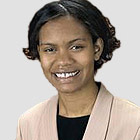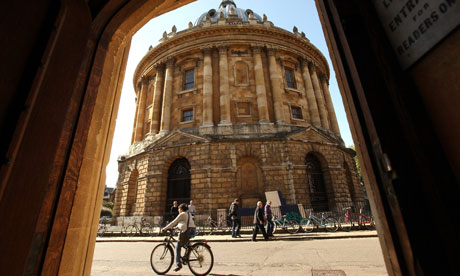Beyond mere talk: how to really help first-generation college students
I am the first in my family to graduate college and earn a doctorate. Getting to this point took guts, luck and some extra aid.

Julia James, theguardian.com, Monday 16 September 2013 12.30 BST, Source
Full disclosure: I'm often plagued by a fear that people will discover that I am an imposter. Objectively, this fear seems unfounded. I am currently a postdoctoral fellow at the University of California, San Francisco (UCSF). I earned a doctorate from the University of Oxford as a Rhodes Scholar in 2011. I recently completed a masters in global health sciences at UCSF. Nonetheless, I still find myself anxiously looking for signs that the "gig is up" because I am the first in my family to have these kinds of experiences – or anything close.
I was born to new American immigrants from Guyana, South America. Neither of my parents graduated from college. My mother never even graduated from high school. My father was a high school graduate and worked as an exterminator. My parents had an acrimonious divorce and custody battle when I was a toddler. In the aftermath, my two older siblings and I were sent to live with our paternal grandmother, Mum Pearl, until shortly before her death in 1991. Then we lived with our father until his death in a robbery in 1993. Finally, we moved in with our paternal aunt in Brooklyn.
The norms of my relatives often conflicted with expectations of my American teachers, as they do for many immigrant families. For example, submission and rigid discipline were the way of life in my household. I quickly learned to be seen but not heard or risk punishment. For my kindergarten teacher, Mrs Bush at a public school in Brooklyn, however my reticence in the classroom was suggestive of a learning disorder. I was placed in a special education class. When I spent much of my days trying to help the other students in the class, the instructor advocated for my placement in a regular first grade class. In a stunning turn of events, I was eventually placed in a program for advanced students, but my early experience was seared into my memory as a reminder that I needed to act like the other kids or else.
This early experience may have had other consequences. My preoccupation with fitting in socially impacted my academic preparation. My SAT scores, necessary to apply to most colleges, were about the national average. My fear that I wouldn't get accepted into any college led me to overcompensate: I applied to 17 universities. When I did get accepted to many of these colleges, I faced another obstacle: preparing the financial aid forms alone. It's a barrier that a lot of first-generation college students struggle to figure out.
Fortunately, I was able to secure free help with the financial aid process from an unlikely source: I contacted the financial aid offices at my top choice colleges and explained my situation. Eventually, I applied for financial aid as an independent student and received generous financial aid from a majority of the colleges. I opted to attend the only college for which a dean met me at the bus station, Hobart and William Smith Colleges (HWS) in Geneva, New York adjacent to Seneca Lake. This personal touch set the tone for my experience at HWS, which culminated in my selection as a Rhodes Scholar in 2003.
Recently, there has been much emphasis on understanding why high-achieving, low-income students fail to apply to highly selective institutions in the US, United Kingdom and other nations. Everyone from the New York Times to the Stanford Institute for Economic Policy Research (pdf) have tried to delve deeper into why students "fall through the cracks"?
I'm glad these discussions are happening and wish they had been going on more when I was preparing for college. Yet even now, there have been few accounts of first-generation college students who attend highly selective institutions such as Harvard and Yale. There are even fewer accounts about early experiences of professionals at the graduate level and beyond and their experiences as first-generation college students.
A few months ago, I heard a talk by a faculty member at UCSF who began by sharing her personal story of being a first-generation college student. She mentioned that there was a networking program for first-generation college students, "FG2C", right here on my campus. She proudly displayed a FG2C button on her ID card. Hearing such a successful researcher and leader share their experience as a first-generation college student inspired to share my own story. I hope those applying to colleges can find solace that so many of us are making it (I still consider myself a work in progress).
I hope to inform institutions who are trying to recruit first-generation college students. Sometimes, it's as simple as sending a smiling representative to the bus stop. This may be true for highly competitive as well as less selective colleges. In my experience, the less selective colleges were more welcoming.
But it goes beyond the application process. I received care packages from a staff member, Lillian Collins, when I was an undergraduate. Although I met Lillian after the packages started arriving (she tended to send them anonymously), they acted to lessen my apprehension about going to the mailroom, where other students excitedly opened packages from their parents. That kind of individual attention was key to my success in college and prepared me well for Oxford and beyond.
My ever present feelings of being an imposter suggest that I have more work to do. The first step has been being open about my fears. It's is no longer a secret I must keep or a mask I must wear among my colleagues. I am a first -generation college graduate. I am also the first in my immediate family to graduate from grad school. And I plan on wearing a FG2C button soon, too.

The Radcliffe Camera, part of the library system at Oxford University. Photograph: Oli Scarff/Getty Images
